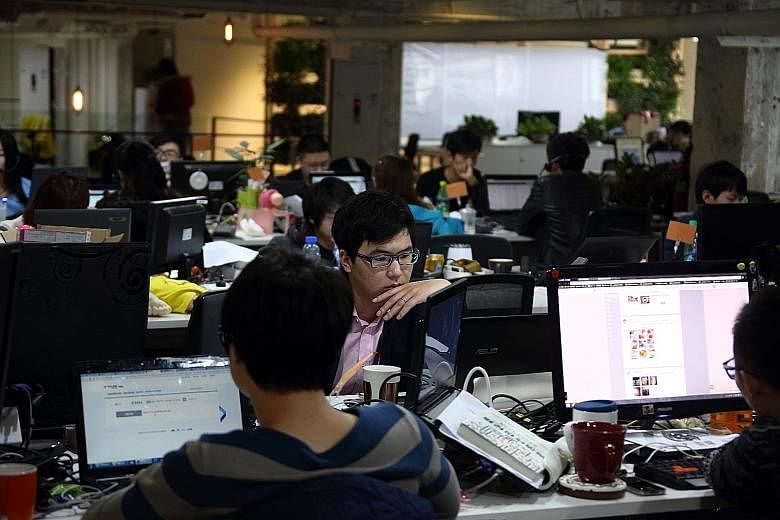SEOUL • Foreigners are beginning to spot opportunities to found their start-ups in Asia, the fastest-growing region in the world.
"What I am seeing is a real increase in entrepreneurship and a real increase in mobility, especially among younger entrepreneurs," said Mr Peter Wall, who is co-founder of Hubud, a co-working space in Bali, Indonesia.
However, it is not easy to set up a foreign start-up across the region. While some hubs, like Singapore, are keener to globalise and attract foreigners, others have a lot of red tape and legal barriers.
The Korea Herald analysed seven regions across Asia on start-up conditions by comparing key factors such as start-up trends, incorporation costs and foreigner employment conditions that would affect foreign entrepreneurs' ability to found start-ups in the area.
Japan
The advantages of setting up in Japan are its huge market, solid infrastructure and world-leading robotics industry, says Mr Chiew Farn Chung, the Malaysian-born co-founder of education technology company ClassDo in Tokyo.
"The infrastructure is insanely good, the opportunity here is seriously large. You can actually do a lot with the really fast broadband speed," he adds.
However, Japan's high corporate taxes as well as language and cultural barriers may be drawbacks for aspiring foreign entrepreneurs.
INCORPORATION COSTS
Start-ups are only required to have 1 yen (S$0.01) of capital. But the entrepreneur needs to invest five million yen to apply for an "investor/
business manager" visa. They also have to pay 150,000 yen to 240,000 yen in fees.
Foreign start-ups must also appoint a local resident director of any nationality
VISAS AND HIRING FOREIGNERS
Foreigners can set up a company in Japan without permanent residence through an investor visa or consultant visa. Foreigners without permanent residential status can work in only a limited number of job categories.
Visa applicants must first secure office space and have at least five million yen to invest, or have hired at least two full-time workers.
China
China is the second-biggest start-up market and the leading "mobile-first" (first encounter with Internet via mobile) market in the world, says Mr William Bao Bean, partner at global accelerator programme SOS Ventures in Beijing.
"There's a lot of innovation coming up in China, which is particularly useful in (introducing products to) other emerging mobile-first markets," he adds.
Setting up in China is heavily dependent on hiring agents, which is not legally required but "you'd be an idiot not to use one", due to their ability to circumvent many start-up restrictions. "In China, there is always a way," Mr Bean says.
INCORPORATION COSTS
Setting up a start-up takes six weeks and costs US$10,000 (S$13,700). However, this can be circumvented by registering a partnership with a local company, which takes three weeks and costs US$9,000.
VISAS AND HIRING FOREIGNERS
100,000 yuan (S$22,000) provides visas for five to six foreign employees, on the condition that companies bring in one million yuan of foreign capital within the next 20 years. Foreigners do not require a visa to set up a business and can later obtain a work visa through their own company.
Singapore
Companies with global aspirations that want to start out in Asia should try out Singapore, says Ms Maria Kuvshinova, co-founder of Clubvivre, an on-demand chef platform.
Low taxes, transparency and an entrepreneurship culture have earned Singapore the reputation as the No. 1 place for foreign start-ups in Asia. Processing applications for start-ups is quick and easy, and everything can be done online.
However, foreign employers need a local partner to register a business. The Government provides subsidies, but most of them apply only to local companies.
INCORPORATION COSTS
Start-ups have to pay a registration fee of S$300 to the Singapore Registrar of Companies. The minimum paid-up capital for registration is S$1. The paid-up capital can be increased after incorporation.
Foreigners who do not live in Singapore need to appoint a local resident director.
VISAS AND HIRING FOREIGNERS
An EntrePass one-year visa can be sought by eligible foreign entrepreneurs with US$50,000 in paid-up capital in a local bank and at least 30 per cent of company shares.
There is a quota for hiring foreign talent, which differs by industry. Firms must pay a foreign worker levy for every such employee.
Taiwan
Start-ups are uncommon in Taiwan and its prevailing culture does not produce many assertive and risk-taking workers, says Ms Rui Ma, partner of 500 Startups, a seed accelerator programme that invests in tech start-ups.
However, Taiwan has a stable and well-educated engineering workforce, and "is on a par with South Korea and Japan in terms of technology infrastructure, but is cheaper to start a business (in)", she says.
The Taiwan government launched an entrepreneur visa programme for foreign entrepreneurs in March. However, legislation can be hard to navigate as some papers lack an equivalent English version.
INCORPORATION COSTS
Start-ups need to pay a registration fee of NT$450 (S$19.70), plus 0.025 per cent of the company's authorised capital, subject to a minimum of NT$1,000. There is no minimum capital requirement for foreign start-ups. However, entrepreneurs need to invest NT$3 million annually for a work permit and alien registration card.
VISAS AND HIRING FOREIGNERS
Foreign professionals with at least a bachelor's degree do not need work experience to join qualifying start-ups.
Thailand
Thailand's start-up scene has only been active since 2012, but is already affordable and friendly towards foreigners, says Mr Amarit Charoenphan, co-founder and co- CEO of Hubba, a start-up co-working space in Bangkok.
"Generally, the environment has been hassle-free and welcoming for expats," he says.
Thailand also provides tax incentives and easier work permit processes for tech start-ups. But many sectors are reserved for Thai nationals, with foreigners restricted in the types of business they can run and limited to a 51 per cent stake.
What is more, "there's not enough available talent pool versus the number of companies that are out there", Mr Charoenphan says.
Additionally, issues such as payment and logistics are problematic.
INCORPORATION COSTS
Start-ups have to pay a fee of 0.55 per cent of their capital in the case of private limited companies.
VISAS AND HIRING FOREIGNERS
Start-ups have to hire one Thai employee for every foreign one. Thailand permits start-ups to hire one foreigner for every two million baht (S$79,000) of fully paid-up registered capital, in the case of up to 10 foreigners. Permits are issued for specific hours and types of work and must be renewed annually.
Hong Kong
Hong Kong is an optimal place to start a business due to its proximity to mainland China, with fewer market and information restrictions, says Mr Simon Galpin, director-general of Invest Hong Kong.
Low taxes, minimal government interference and simple incorporation processes are also an advantage. English is also well-spoken in the region.
Mr Galpin says Hong Kong does not have foreign employee quotas or any other restrictions, and that set-up costs and procedures are the same for every applicant.
"Hong Kong's free market mechanism means that everybody is treated the same in the market," he says.
INCORPORATION COSTS
The incorporation cost of a start-up is about US$1,200. Start-ups must have at least one director, one local corporate secretary and a physical location in Hong Kong. No share capital is required. Forming a local company via partnership costs US$200 to US$300.
VISAS AND HIRING FOREIGNERS
Hong Kong grants employment visas for skilled professionals such as software engineers, doctors and research and development specialists. Under a supplementary labour scheme, semi-skilled professionals such as technicians can be hired.
Indonesia
"The best thing about Indonesia is that anything is possible. The worst thing about Indonesia is that anything is possible," says Mr Wall, the co-founder of Hubud.
Unfortunately, there is a lot of red tape for foreigners in Indonesia. Firstly, start-up companies are not yet categorised as to whether foreigners can own them completely. Additionally, the incorporation process is difficult, costs much more for foreign companies compared to locals and, according to Indonesian market entry services Indosight, takes around 10 weeks.
The Indonesian government mostly views foreign workers as temporary workers to be replaced by Indonesians in the long run. The government also constantly changes its labour laws, which makes running a start-up difficult.
INCORPORATION COSTS
Start-ups are required to invest US$1 million over three years, with 25 per cent in paid-up capital.
VISAS AND HIRING FOREIGNERS
Only foreigners deemed "experts" in their field can work in Indonesia. Companies employing foreigners must pay US$100 per month to the Manpower Ministry.
To apply for visas, start-ups need a physical office and proof of investment, and must submit investment reports every three months until they receive an "IUT" permanent business licence.
THE KOREA HERALD/ASIA NEWS NETWORK


